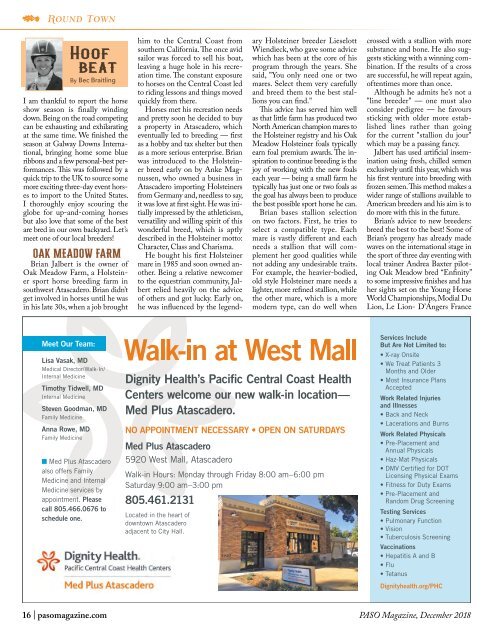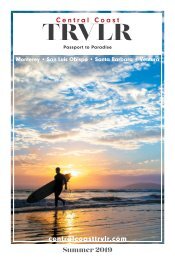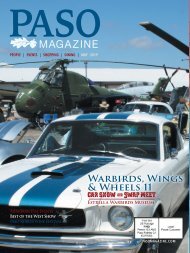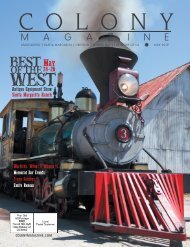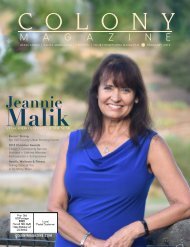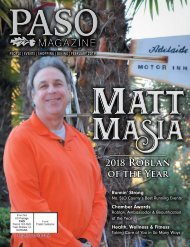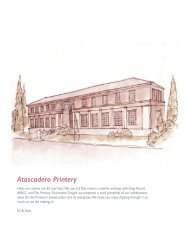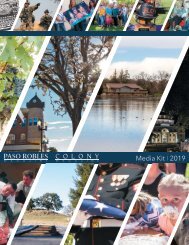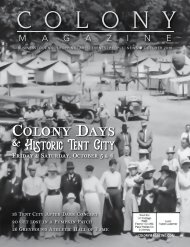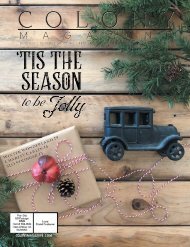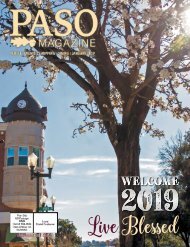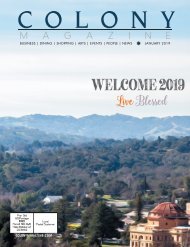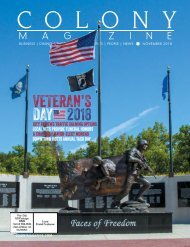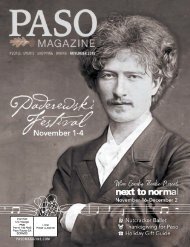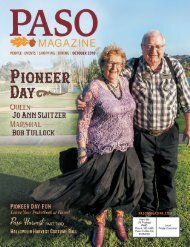2018 December Paso Robles Magazine
The Story of Us — a Monthly Look at the Extraordinary Community of Paso Robles, California.
The Story of Us — a Monthly Look at the Extraordinary Community of Paso Robles, California.
You also want an ePaper? Increase the reach of your titles
YUMPU automatically turns print PDFs into web optimized ePapers that Google loves.
ROUND TOWN<br />
By Bec Braitling<br />
I am thankful to report the horse<br />
show season is finally winding<br />
down. Being on the road competing<br />
can be exhausting and exhilarating<br />
at the same time. We finished the<br />
season at Galway Downs International,<br />
bringing home some blue<br />
ribbons and a few personal-best performances.<br />
This was followed by a<br />
quick trip to the UK to source some<br />
more exciting three-day event horses<br />
to import to the United States.<br />
I thoroughly enjoy scouring the<br />
globe for up-and-coming horses<br />
but also love that some of the best<br />
are bred in our own backyard. Let’s<br />
meet one of our local breeders!<br />
Brian Jalbert is the owner of<br />
Oak Meadow Farm, a Holsteiner<br />
sport horse breeding farm in<br />
southwest Atascadero. Brian didn’t<br />
get involved in horses until he was<br />
in his late 30s, when a job brought<br />
him to the Central Coast from<br />
southern California. The once avid<br />
sailor was forced to sell his boat,<br />
leaving a huge hole in his recreation<br />
time. The constant exposure<br />
to horses on the Central Coast led<br />
to riding lessons and things moved<br />
quickly from there.<br />
Horses met his recreation needs<br />
and pretty soon he decided to buy<br />
a property in Atascadero, which<br />
eventually led to breeding — first<br />
as a hobby and tax shelter but then<br />
as a more serious enterprise. Brian<br />
was introduced to the Holsteiner<br />
breed early on by Anke Magnussen,<br />
who owned a business in<br />
Atascadero importing Holsteiners<br />
from Germany and, needless to say,<br />
it was love at first sight. He was initially<br />
impressed by the athleticism,<br />
versatility and willing spirit of this<br />
wonderful breed, which is aptly<br />
described in the Holsteiner motto:<br />
Character, Class and Charisma.<br />
He bought his first Holsteiner<br />
mare in 1985 and soon owned another.<br />
Being a relative newcomer<br />
to the equestrian community, Jalbert<br />
relied heavily on the advice<br />
of others and got lucky. Early on,<br />
he was influenced by the legendary<br />
Holsteiner breeder Lieselott<br />
Wiendieck, who gave some advice<br />
which has been at the core of his<br />
program through the years. She<br />
said, "You only need one or two<br />
mares. Select them very carefully<br />
and breed them to the best stallions<br />
you can find."<br />
This advice has served him well<br />
as that little farm has produced two<br />
North American champion mares to<br />
the Holsteiner registry and his Oak<br />
Meadow Holsteiner foals typically<br />
earn foal premium awards. The inspiration<br />
to continue breeding is the<br />
joy of working with the new foals<br />
each year — being a small farm he<br />
typically has just one or two foals as<br />
the goal has always been to produce<br />
the best possible sport horse he can.<br />
Brian bases stallion selection<br />
on two factors. First, he tries to<br />
select a compatible type. Each<br />
mare is vastly different and each<br />
needs a stallion that will complement<br />
her good qualities while<br />
not adding any undesirable traits.<br />
For example, the heavier-bodied,<br />
old style Holsteiner mare needs a<br />
lighter, more refined stallion, while<br />
the other mare, which is a more<br />
modern type, can do well when<br />
crossed with a stallion with more<br />
substance and bone. He also suggests<br />
sticking with a winning combination.<br />
If the results of a cross<br />
are successful, he will repeat again,<br />
oftentimes more than once.<br />
Although he admits he’s not a<br />
"line breeder" — one must also<br />
consider pedigree — he favours<br />
sticking with older more established<br />
lines rather than going<br />
for the current "stallion du jour"<br />
which may be a passing fancy.<br />
Jalbert has used artificial insemination<br />
using fresh, chilled semen<br />
exclusively until this year, which was<br />
his first venture into breeding with<br />
frozen semen. This method makes a<br />
wider range of stallions available to<br />
American breeders and his aim is to<br />
do more with this in the future.<br />
Brian’s advice to new breeders:<br />
breed the best to the best! Some of<br />
Brian’s progeny has already made<br />
waves on the international stage in<br />
the sport of three day eventing with<br />
local trainer Andrea Baxter piloting<br />
Oak Meadow bred “Enfinity”<br />
to some impressive finishes and has<br />
her sights set on the Young Horse<br />
World Championships, Modial Du<br />
Lion, Le Lion- D’Angers France<br />
16 | pasomagazine.com PASO <strong>Magazine</strong>, <strong>December</strong> <strong>2018</strong>


